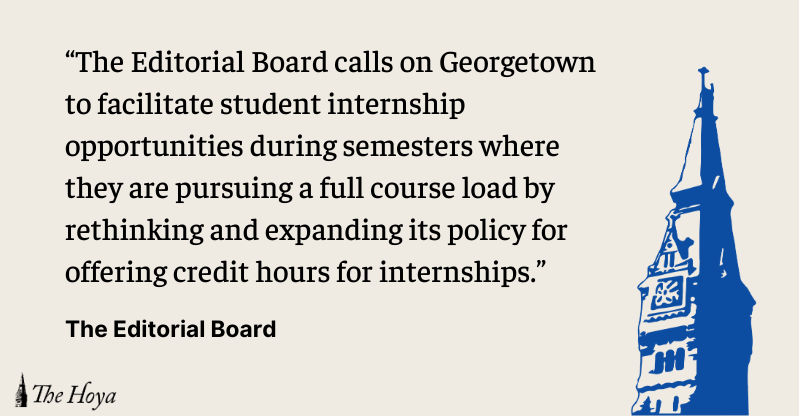Each semester at Georgetown University, undergraduate students participate in meaningful research opportunities, collaborating with their peers and professors to generate knowledge.
This work aligns with Georgetown’s attitude toward undergraduate involvement in research. The university’s mission is clear in its assertion that participation in research is an enriching experience for undergraduate students.
“The purpose of our university is not the acquisition of knowledge but the search for deeper knowing,” the university website reads. “Rather than imagine your education as downloading information or facts, reimagine your education as a process of seeking, questioning, probing, arguing, and creating.”
This commitment to enriching research opportunities follows Georgetown’s Jesuit value of educating the whole person. Research requires students to exercise different ways of thinking and must be considered as a crucial component of a well-rounded Georgetown education.
Yet the current reality of undergraduate research at Georgetown does not reflect this institutional commitment to the generation of knowledge. No centralized system exists to keep track of ongoing research on campus — rather, students have reported needing to reach out to professor after professor until they find one who is conducting appropriate research and has the capacity to take on another student.
The Editorial Board calls on Georgetown University administrators to create a single database, where all undergraduates can locate research assistant positions, to streamline the process for undergraduate students who wish to obtain research experience.
Pennsylvania State University’s Undergraduate Research Opportunities Database is a model research database. Despite being a large university composed of multiple undergraduate colleges, the site allows students to search for research positions across the entire university, sorting by campus, department and funding source to find a role that matches their criteria.
A university spokesperson said that what is required to obtain a research position varies across schools and professors.
“Georgetown’s undergraduate programs have developed processes to engage students in research, but the mechanisms vary both by department and by professor,” a university spokesperson wrote to The Hoya. “Different departments help administer research opportunities within their areas in different ways appropriate to the nature of the research being conducted by their faculty.”
The university spokesperson also said the university views research as a central component of a Georgetown education.
“Georgetown is a student-centered research university deeply committed to undergraduate research,” a university spokesperson wrote to The Hoya. “Georgetown students have access to state-of-the-art research facilities and world-class faculty who are eager to train and mentor the next generation of scholars.”
The issue, however, is how students can access these facilities and fellowships.
Gatik Gogia (SOH ’26) has worked in professor Ted Nelson’s lab doing research on nematodes since Spring 2023. He said although the human science program in the School of Health (SOH) provided some structure for obtaining a research position — primarily through the “Research Methods” class in which different professors came in to discuss their research projects — the onus is primarily on students to find research opportunities.
“I ended up emailing one of my professors, Ted Nelson, who came into one of my classes to discuss his research, asking if there was room in his lab,” Gogia said to The Hoya. “We scheduled a meeting and I ended up shadowing another student in the lab for one semester before developing my own research stream for the lab.”
Gogia said he has only been able to accrue research experience because he was proactive in reaching out to professors who he knew.
“I think it really depends on whether professors have spots in their labs and knowing the right people to get in touch with,” Gogia said. “And you just have to ask as many people as you can.”
A streamlined database for undergraduate research opportunities would make access to these positions more equitable for students across all academic programs. Although some majors, like human science, might provide in-class opportunities for students to familiarize themselves with on-campus research, non-STEM students often do not enjoy the same privilege.
Regardless of major, Georgetown students should be aware of all the research opportunities available to them.
Georgetown is an institution that facilitates incredible undergraduate research. The Center for Research and Fellowships (CRF) supports students in pursuit of prestigious fellowships like the Marshall and Rhodes Scholars programs.
The CRF also works to support research by referring students to the Georgetown University Undergraduate Research Opportunities Program (GUROP), a university-wide program that facilitates undergraduate student participation in faculty-led research projects. Another example of the university supporting research is with the Georgetown Undergraduate Research Conference, a conference highlighting undergraduate student research hosted by the SOH,
But even GUROP requires undergraduates to identify their own faculty sponsor. For many students, finding a professor to work with can be seen as a barrier to entry to research.
Students should not have to dig around on the university website or happen to know the right professor to be aware of these opportunities. In order to live up to its mission and be a university where the general educational experience involves participation in research, the university must make these opportunities more accessible by creating a singular website.
Convenience and support in the search process — which is already an intimidating and difficult one — will help to prepare students for life after college and equip them with the necessary experiences many fields often require for entry-level positions. This commitment to providing accessible opportunities for Georgetown students fosters an environment conducive to academic excellence, empowering students with the necessary experiences for post-graduate success.
The Hoya’s Editorial Board is composed of six students and is chaired by the opinion editors. Editorials reflect only the beliefs of a majority of the board and are not representative of The Hoya or any individual member of the board.




















